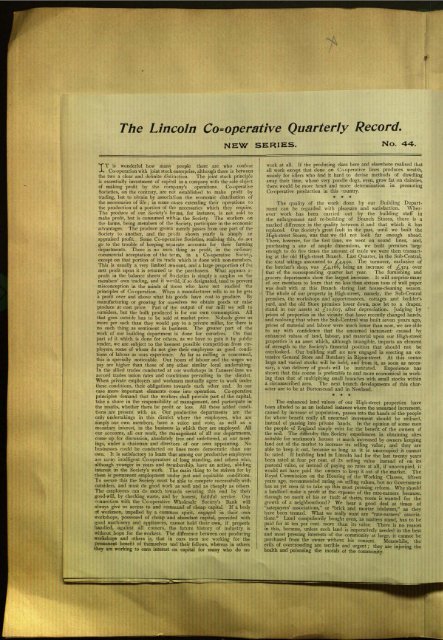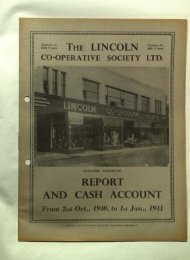11'II.Olll @I)lltiftble KO-Opi. - Lincolnshire Co-operative Archive
11'II.Olll @I)lltiftble KO-Opi. - Lincolnshire Co-operative Archive
11'II.Olll @I)lltiftble KO-Opi. - Lincolnshire Co-operative Archive
You also want an ePaper? Increase the reach of your titles
YUMPU automatically turns print PDFs into web optimized ePapers that Google loves.
The Lincoln <strong>Co</strong>=<strong>operative</strong> Quarterly Record<br />
74 K'tXT SKR I KS.<br />
IT is wonderful how many people there are who confuse<br />
<strong>Co</strong>-operation with joint stock enterprise, although there is between<br />
the two a clear and definite distinction. The joint stock princip'. e<br />
is essentially investment of capital in a company with the sole object<br />
of making profit by the company's operations. <strong>Co</strong>-<strong>operative</strong><br />
Societies, on the contrary, are not established to make profir by<br />
trading, but to obtain by association the economic distribution of<br />
the necessaries of life; in some cases extending their operations in<br />
the production of a portion of the necessaries which they require.<br />
The produce of our Society's farms, for instance, is not sold to<br />
make profit, but is consumed within the Society. The workers on<br />
the farms, being members of the Society, participate in the economic<br />
advantages. The produce grown merely passes from one part of the<br />
Society to another, and the pr, fit shown yearly is simply nn<br />
appraised profit. Some <strong>Co</strong>-<strong>operative</strong> Societies, realising this, do nni<br />
go to the trouble of keeping selarate accounts for their farming<br />
departments. There is no sucn thing as profit, in the ordinarr<br />
commercial acceptatinn of the te m, in a <strong>Co</strong>-<strong>operative</strong> Societ;,<br />
except on that portion of its trade which is done with non-members.<br />
This is usually a very limited aniount, and a large proportion of ihe<br />
nett profit upon it is returned to the purchasers. What appears:iprofit<br />
in the balance sheets of Societies is simply a surplus on ihe<br />
members' own trading, and it would, if so designated, tend to prevent<br />
misconception in the minds of those who have not studied the<br />
principles of <strong>Co</strong>-operation. When a manufacturer sells to us he g.ts<br />
a profit over and above what his goods have cost to produce. By<br />
manufacturing or growing for ourselves we obtain goods or raise<br />
produce at cost price. Part of the output of our mill we sell to<br />
outsiders, but the bulk produced is for our own consumption. All<br />
that goes outside has to be sold at marl-et price. Nobody gives us<br />
more per sack than they would pay to a private miller, for there is<br />
no such thing as sentiment in business. The greater part of the<br />
work of our building department is done for ourselves. On that<br />
part of it which is done for others, as we have to gain it by public<br />
tender, we are subject to the keenest possible competition from employers,<br />
some of whom do not give their employees as good conditions<br />
of labour as ours experience. As far as milling is concerned,<br />
this is specially noticeable. Our hours of labour and the wages we<br />
pay are higher than those of any other similar local undertaking. .<br />
In the allied trades conducted at our workshops in I'anners'-lane we<br />
accord trades union rates and conditions prevailing in the district.<br />
When private employer's and workmen mutually agree to work under<br />
these conditions, their obligations towards each other end. In our<br />
case more important elements come into operation. <strong>Co</strong>-<strong>operative</strong><br />
principles demand that the workers shall provide part of the capital,<br />
take a share in the responsibility of management, and participate in<br />
the results, whether there be profit or loss. All these added conditions<br />
are present with us. Our productive departments are the<br />
only undertakings in this district where the employees, who are<br />
simply our own members, have a voice and vote, as well as a<br />
monetary interest, in the business in which they are employed. All<br />
our accounts, all our work, the management of all our departments,<br />
come up for 'discussion, absolutely free and unfettered, at our meetings,<br />
under a chairman and directors of our own appointing. No<br />
businesses could be conducted on lines more democratic than our<br />
own. It is satisfactory to learn that among our productive employees<br />
are mony intelligent <strong>Co</strong>-operators of long standing, and others who,<br />
although pounger in years and inembership, have an active, abiding<br />
interest in the Society's work. The main thing to be striven for by<br />
them is permanent employment under just and equitable conditions.<br />
To secure this the Society must be able to compete successfully with<br />
outsiders, and must do good work as well and as cheaply as others<br />
The emplopees can do much towards securing this end by their<br />
good-will, by' checking waste, and by honest, faithful service. Our<br />
connection with the <strong>Co</strong>-<strong>operative</strong> Wholesale Society's Bank will<br />
always give us access to and command of cheap capital. If a body<br />
of worlnnen„ impelled by a common spirit, engaged in their own<br />
workshops, possessed of cheap and abundant capital, provided with<br />
good machinery and appliances, cannot hold their own, if properlv<br />
handled, against all comers, the future history of industry is<br />
without hope for the workers. The difference between our producirig<br />
sktitkshops and others is, that in ours men are worl ing for the<br />
emitinent benefit of themselves and their fellows, whereas in others<br />
they, ase working to earn interest on capital for many who do no<br />
work at all. If the producing class here and elsewhere realised that<br />
all work except that done on <strong>Co</strong>-<strong>operative</strong> lines produces wealth,<br />
mainly for idlers who 6nd it hard to devise methods of dawdling<br />
away their time, whose very poodle dogs, even, grow fat on dainties,<br />
there would be more heart and more determination in promoting<br />
<strong>Co</strong>-<strong>operative</strong> production in this country.<br />
The quality of the work done by our Building Department<br />
can be regarded with pleasure and satisfaction. Wherever<br />
work has been carried out by the building stafF in<br />
the enlargement and re-building of Branch Stores, there is a<br />
marked difference in the quality between it and that which it has<br />
replaced. Our Society's great fault in the past, until we built the<br />
High-street Stores, was that we did not look far enough ahead.<br />
There, however, for the first time, ive went on sound lines, and,<br />
purchasing a site of ample dimensions, we built premises large<br />
enough to do five times the amount of trade we were then transacting<br />
at the old High-street Branch. Last Quarter, in the Sub-Central,<br />
the total takings amounted to +4,96o. The turnover, exclusive of<br />
the butcher's shop, was +4,r66, being an increase of gfie4 over<br />
' that of the corresponding quarter last year. The furnishing and<br />
grocery departments show the largest increase. It will surprise many<br />
of our members to learn that no less than sixteen tons of wall paper<br />
was dealt with at this Branch during last house-cleaning season.<br />
The whole of our property in High-street, namely, the Sub-Central<br />
premises, the workshops and appurtenances, cottages and builder's<br />
yard, and the old Store premises lower down, now let to a draper,<br />
' stand in our assets at pro, 6op, after depreciation. Judging by<br />
prices of properties in the vicinity that have recently changed hands,<br />
and realising that when the Sub-Central was built seven years ago,<br />
prices of material and labour were much lower than now, we are able<br />
to sap with confidence that the unearned increment caused by<br />
enhanced values of land, labour, and material upon our High-street<br />
properties is an asset which, akhough intangible, imparts an element<br />
of strength to the Society's finsncial position that should not be<br />
overlooked. Our building staff are now engaged in erecting an extensive<br />
General Store and Butchery in Ripon-street. At this centre<br />
large and varied stocks will be held, and from it, as soon as necessary,<br />
a van delivery of goods will be instituted. Experience has<br />
shown that this course is preferable to and more economical in working<br />
than that of multiplying small branches with small stocks within<br />
a circumscribed area. The next branch developments of this character<br />
are to be at Burton-road and in Newland.<br />
The enhanced land values of our High-street properties have<br />
been alluded to as an isolated instance where the unearned increment,<br />
caused by increase of population, passes into the hands of the people<br />
for whose benefit really all unearned increment should be utilised,<br />
instead of passing into private hands. In the opinion of some men<br />
the people of England simply exist for the benefit of the owners if<br />
the soil. The difficulty this Society experiences in obtaining sites<br />
suitable for workmen's houses is much increased by owners keeping<br />
land out of the market to increase its selling value; and they are<br />
able to leep it out, because so long as it is unoccupied it cannot<br />
bc rated. If building land in Lincoln had for the last twenty pes s<br />
been rated at four per cent. of its selling value instead of on its<br />
pastoral value, or instead of paying no rates at all, if unoccupied, it<br />
would not have paid the owners to keep it out of the market. The<br />
Ropal <strong>Co</strong>mmission on the Housing of the Wor4ng Classes, fifteen<br />
years ago, recommended rating on selling values, but no Government<br />
has as pet seen fit to take up this most pressing reform. Whp should<br />
a landlord make a profit at the expense of the rateearners because,<br />
through no merit of his or fault of theirs, room is wanted for the<br />
growth of a neighbourhood? We heat a. good deal at times of<br />
"ratepayers' associations, " or "brick and mortar idolaters, " as they<br />
have been termed. What we really want are "rate-earners' associations.<br />
" Land compulsorily bought even, as matters stand, has to be<br />
paid for at ten per cent. more than its value. There is no reason<br />
in this, because, unless such land is imperatively needed in the best<br />
and most pressing interests of the community at large, it cannot be<br />
purchased fmm the owner without his consent. Meanwhile, the<br />
evils of overctowding are terrible and urgent; they are injuring the<br />
health arid poisomng the morals of the community.







